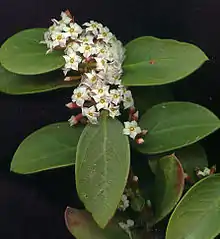| Acokanthera oppositifolia | |
|---|---|
 | |
| Scientific classification | |
| Kingdom: | Plantae |
| Clade: | Tracheophytes |
| Clade: | Angiosperms |
| Clade: | Eudicots |
| Clade: | Asterids |
| Order: | Gentianales |
| Family: | Apocynaceae |
| Genus: | Acokanthera |
| Species: | A. oppositifolia |
| Binomial name | |
| Acokanthera oppositifolia | |
| Synonyms[1] | |
| |

Acokanthera oppositifolia, the poison arrow tree, is a shrub used as the source of an arrow poison and to coat caltrops made from the sharp fruits of the puncture vine (Tribulus terrestris). All plants of the genus Acokanthera contain toxic cardiac glycosides strong enough to cause death. Acokanthera oppositifolia is widespread in southern and central Africa from Cape Province north to The Democratic Republic of the Congo + Tanzania.[1][2]
Acokanthera schimperi is employed for the same purpose.
Unlike all other parts of the plant, the ripe fruit is sweet and edible. Unripe fruit are still poisonous, so only really ripe fruit are eaten.[3]
References
- 1 2 "World Checklist of Selected Plant Families: Royal Botanic Gardens, Kew". apps.kew.org. Retrieved 2017-08-07.
- ↑ Calane da Silva, M., Izdine, S. & Amuse, A.B. (2004). A Preliminary Checklist of the Vascular Plants of Mozambique: 1-184. SABONET, Pretoria.
- ↑ Ruffo, Christopher K.; Birnie, Ann; Tengnäs, Bo (2002). Edible wild plants of Tanzania. Regional Land Management Unit/Sida. ISBN 9966-896-62-7.
This article is issued from Wikipedia. The text is licensed under Creative Commons - Attribution - Sharealike. Additional terms may apply for the media files.